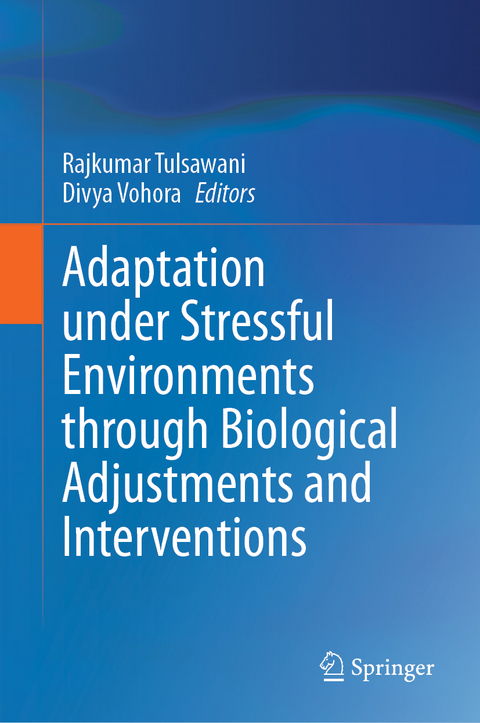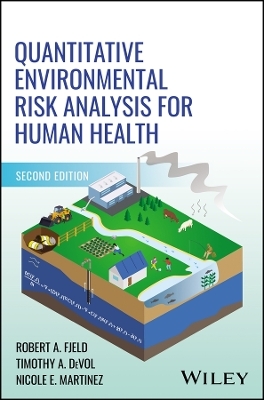
Adaptation under Stressful Environments through Biological Adjustments and Interventions
Springer Verlag, Singapore
978-981-99-7651-5 (ISBN)
The book's focal point rests on adaptive mechanisms that vary with stressor types, while also spotlighting how these mechanisms can be calibrated through pharmacological and alternative means. This is an invaluable resource for understanding, mitigating, and harnessing the power of adaptation in the face of stress-induced challenges.
Dr. Rajkumar Tulsawani is a scientist at the Defence Institute of Physiology and Allied Sciences, Delhi, India, since January 2006. Previously, served at Defence Research and Development Establishment, Gwalior, India; 2000–2006. He obtained his PhD in zoology from Jiwaji University, Gwalior, Madhya Pradesh, India, in 2007 and visited the University of Nebraska Medical Center, Omaha, USA, during 2009–2010 for post-doctoral research work. Dr. Rajkumar Tulsawani has gained expertise in biomedical sciences and related research areas including pharmacology, toxicology, cellular biology, molecular biology, and analytical techniques. He has research experience in the identification of causes/mechanisms of cyanide and sulfur mustard poisoning (scheduled warfare agents) and the development of therapeutic agents to neutralize their toxic effects. Presently, Dr. Tulsawani’s research program focuses on understanding the biological response to hypoxia including chemical and physiological hypoxia and high-altitude maladies, its clinical implication, and therapeutic targeting of hypoxia-responsive pathways. Additionally, he is pursuing research work on understanding the bio-effects and safety of high-energy lasers. He is a recipient of many awards, notably the DRDO Technology Award, 2023; Gufic Prize, 2019; the Director Award for S&T Coordination, 2019; the Medal of Excellence from Air Force Research Laboratory (AFRL), US DoD, 2018; the DIPAS Laboratory Scientist of the Year, 2016; the CSIR Young Scientist Award from Indian Pharmacology Society, 2005; the Young Scientist Award from Society for Toxicology, 2005; and the Best Performance Award from Defence Research and Development Establishment, Gwalior, India, 2001. He is a recipient of the DST-BOYSCAST fellowship for visiting the University of Nebraska Medical Center, Omaha, USA, in 2009–2010, and served as an external examiner to the universities. He has been associated with three patents (two granted; one atgranting stage) and the development of five products; an antidote for cyanide poisoning, a natural performance enhancer, an adaptogen, herbal sanitizer, and herbal sanitizing wipes/towels (for COVID-19 pandemic). He has published over 50 research publications and 2 book chapters, and has been a reviewer of many peer-reviewed journals. He has guided more than 55 scholars (research intern/PhD/Post-doctoral). Prof. (Dr.) Divya Vohora is Professor of Pharmacology in the School of Pharmaceutical Education and Research (SPER) at Jamia Hamdard, New Delhi. She has over 24 years of teaching/research experience and has held positions as HoD, Pharmacology; Assistant Dean, Student’s Welfare; Director, DODL; andIn-charge of Pharmaceutical Medicine (joint collaborative doctoral program with Sun Pharma). She has over 200 publications in national and international journals of repute with over 4300 citations and an h-index of 37 as of August 2023. She is also the author/editor of four books published by Elsevier, Springer Nature, and CRC Press, USA. More than 80 research degrees (Master’s/PhD/MD) in Pharmacology have been awarded under her supervision. Prof. Vohora has received prestigious fellowships including fellowship of the National Academy of Medical Sciences (FAMS), India; Indian Pharmacological Society (FIPS); British Pharmacological Society (FBPhS); and Royal Society of Biology, UK (FRSB). She has been listed among the Top 2% of World Scientists by Stanford University study for the whole career and for single year impact in 2020–2021 and 2021–2022. She is a recipient of several awards including the Dr. B.K. Anand Oration Award and Dr. Vinod Kumar Bhargava Award of the National Academy of Medical Sciences; Distinguished Woman Scientist Award of the Indian Society of Chemists Biologists; Dr. D.N. Prasad Memorial Oration Award of the Indian Council of Medical Research; Pharm Innova Award, Career Award for Young Teachers by AICTE; FastTrack Award for Young Scientists by DST, Government of India; and Chandra Kanta Dandiya Prize in Pharmacology. She is a member of the International Advisory Group of the British Pharmacological Society, UK, and is an expert member for research grants submitted to the National Science Centre, Poland, and La Caixa Foundation, Spain. She has worked as a PI on several research grants funded by AICTE, ICMR, UGC, CSIR, and DST, Government of India. Her major areas of research interest are neuropharmacology particularly epilepsy, and neurodegenerative diseases including Alzheimer’s disease and associated comorbidities particularly secondary osteoporosis.
Part I. Hypoxic, High-Altitude, and Extreme Stress: Health Implications and Interventions.- Chapter 1. Stress and Adaptogens.- Chapter 2. Molecular Basis of Response to Hypoxia.- Chapter 3. Activation of the Hypoxia-Inducible Factor under High Altitude Stress.- Chapter 4. Regulation of Vascular Endothelial Growth Factor by SUMOylation in Hypoxic Cardiomyocytes.- Chapter 5. Expression of Vascular Endothelial Growth Factor at High Altitude.- Chapter 6. Thrombogenetic Risk at High Altitude: Early Diagnosis and Treatment Modalities.- Chapter 7. Leaky Gut at High Altitude: Synbiotics May be a Possible Solution.- Chapter 8. Human Gastrointestinal Tract: Impact of Hypobaric Hypoxia.- Chapter 9. Mechanism of Skeletal Muscle Atrophy at High Altitude: Role of Herbals and Nutraceuticals.- Chapter 10. Altitude Acclimatization via Pharmacological and Non-Pharmacological Interventions.- Chapter 11. Performance Enhancement under Extreme Stressful Environment.- Chapter 12. Military Footwearand Extreme Environment Operations: An Ergonomics Perspective.- Chapter 13. Therapeutic Significance of Tanshinone: Pathophysiology and Disruptive Technologies.- Chapter 14. Acclimatization: A Way to Cope-up with a Stressful Environment.- Part II. Oxidative & Genotoxic Stress: Health Implications and/or Approaches to Management.- Chapter 15. Genotoxin Stress and the Role of Alkaloids.- Chapter 16. Cellular Stress, Survival Mechanism, and Adaptation.- Chapter 17. Malnutrition-Induced Oxidative Stress in the Nervous System and Its Health Implications.- Chapter 18. Oxidative Medicine & Novel Pharmacological Treatment Approaches in Liver Disease.- Chapter 19. Sleep, Brain, and Stress.- Chapter 20. Senolytics in Brain Disorders - A Novel Pharmacological Approach to Control Cellular Senescence and Oxidative Stress.- Part III. Stress Management through Dietary Modifications and Nutritional Interventions.- Chapter 21. Prevention of Pro-Inflammatory Markers by Medicinal MushroomsUnder Stressful Environment.- Chapter 22. Nutraceuticals in Alleviating Aging.- Chapter 23. Heat Stress and Dehydration.- Chapter 24. Management of Stress through Dietary Modifications.- Chapter 25. Dietary Modifications to Manage Stress.
| Erscheinungsdatum | 18.01.2024 |
|---|---|
| Zusatzinfo | 1 Illustrations, black and white; XXIV, 404 p. 1 illus. |
| Verlagsort | Singapore |
| Sprache | englisch |
| Maße | 155 x 235 mm |
| Themenwelt | Medizin / Pharmazie ► Gesundheitsfachberufe ► Diätassistenz / Ernährungsberatung |
| Medizin / Pharmazie ► Medizinische Fachgebiete ► Arbeits- / Sozial- / Umweltmedizin | |
| Medizin / Pharmazie ► Medizinische Fachgebiete ► Pharmakologie / Pharmakotherapie | |
| Medizin / Pharmazie ► Medizinische Fachgebiete ► Psychiatrie / Psychotherapie | |
| Medizin / Pharmazie ► Pharmazie | |
| Studium ► Querschnittsbereiche ► Klinische Umweltmedizin | |
| Naturwissenschaften ► Biologie ► Biochemie | |
| Naturwissenschaften ► Biologie ► Zellbiologie | |
| Schlagworte | Adaptation • Adaptive Resilience • Extreme stress • Nutraceuticals • Oxidative stress • Stress signalling |
| ISBN-10 | 981-99-7651-0 / 9819976510 |
| ISBN-13 | 978-981-99-7651-5 / 9789819976515 |
| Zustand | Neuware |
| Informationen gemäß Produktsicherheitsverordnung (GPSR) | |
| Haben Sie eine Frage zum Produkt? |
aus dem Bereich
